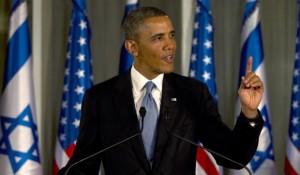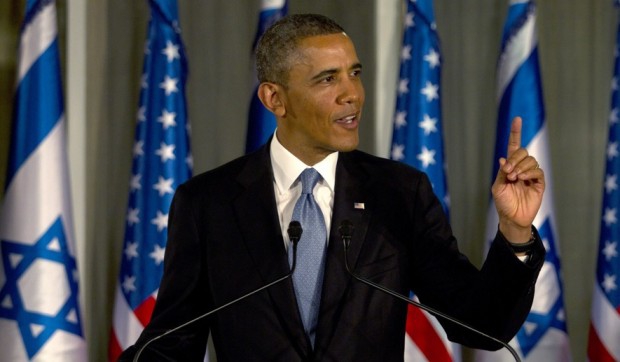 On his first state visit to Israel, President Barack Obama said Wednesday the United States �will do what is necessary� to prevent Iran from getting nuclear weapons and was praised by Prime Minister Benjamin Netanyahu for his resolve.
On his first state visit to Israel, President Barack Obama said Wednesday the United States �will do what is necessary� to prevent Iran from getting nuclear weapons and was praised by Prime Minister Benjamin Netanyahu for his resolve.During a joint press conference peppered with warm exchanges, two leaders who have not always seen eye to eye stressed points of agreement, even clarifying that both Israel and the U.S. believe it would take about a year for Iran to develop a nuclear weapon,
But there were also some signs of disagreement.
While Obama said �there is still time� to find a diplomatic solution to the problem of Iran�s uranium-enrichment program, Netanyahu emphasized the clock is ticking.
�Whatever time is left, there�s not a lot of time,� he said.
Praising Obama for mobilizing the international community, Netanyahu noted that �diplomacy and sanctions so far have not stopped Iran's nuclear program� and called for a �clear and credible threat of military action.�
Responding that all options are on the table, Obama said, �We will do what is necessary to prevent Iran from getting the world's worst weapons.�
Still, he suggested that the U.S. and Israel might have different timetables for how and when to respond.
�Each country has to make its own decisions when it comes to the awesome decision to engage in any kind of military action. And Israel is differently situated than the United States,� Obama said.
Netanyahu also spoke of �different vulnerabilities� but stressed the common ground.
�I appreciate the fact that the president has reaffirmed, more than any other president, Israel's right and duty to defend itself, by itself, against any threat,� he said.
The press conference, in which both men made statements and answered four questions,�also focused on the situation in Syria and the prospects for Israeli-Palestinian peace.
�Israel remains fully committed to peace and to the solution of two states for two peoples,� Netanyahu said, adding that he hoped Obama�s visit and his meeting Thursday with Palestinian officials in the West Bank would �help us turn a page in our relations with the Palestinian people.�
Asked about claims that Syrian President Bashar Assad�s regime used chemical weapons Tuesday, Obama said the U.S. is still investigating but he is �deeply skeptical� of the government�s allegation that the opposition deployed the weapons.
�I believe Assad must go and I believe he will go,� Obama said.
Meeting with Peres
The question-and-answer session came hours after Obama declared that Israel has "no greater friend than the United States," following a meeting with Israel�s President Shimon Peres.
Peres warmly praised Obama as �very knowledgeable,� adding there could be �no better� leader to take the peace process forward. He also thanked Obama for the �lots of sleepless nights� the president had endured in support of Israel.
Earlier Wednesday, Obama was met at Tel Aviv's airport by Netanyahu and Peres, along with a military band and a host of other officials and dignitaries.
All three men gave speeches that emphasized the friendship between the U.S. and Israel � Netanyahu spoke of the �unbreakable alliance,� Obama the �unbreakable bond.�
Obama, who began his speech with �shalom,� said he was �confident in declaring that our alliance is eternal.�
�The United States is proud to stand with you as your strongest ally and your greatest friend,� he said.
He said it was not an accident that he had made the first overseas trip of his second term in office to Israel.
�Across this region, the winds of change bring both promise and peril,� Obama said, likely a reference to the Arab Spring uprisings that saw an Islamist president voted into power in Egypt and a civil war erupt in Syria.
In his speech, Netanyahu thanked Obama for �standing by Israel at this time of historic change in the Middle East.�
�We deeply appreciate your friendship and we share your hope that the Middle East will enjoy a future of freedom, prosperity and peace,� he added.
Picking up on comments Obama made before the trip �- expressing the desire to put on a disguise and go to a Tel Aviv bar -- Netanyahu joked that he had lined up a few locations and �even picked out a fake mustache for you.�
Obama also viewed an �Iron Dome� air defense missile launcher, a�U.S.-funded system that was brought to the airport for him to see. The system has helped protect Israelis from Hamas rocket attacks from Gaza.
On Thursday, the president will meet Palestinian President Mahmoud Abbas in the West Bank, where he can expect�a mixed reception.
"It's not a positive visit," Wasel Abu Yousef, a senior official in the Palestine Liberation Organization, which is led by Abbas, told Reuters.
In Ramallah on Tuesday, Palestinian police scuffled with scores of demonstrators protesting Obama's visit.
Obama is likely to offer reassurance that the U.S. still supports the creation of an independent Palestinian state.
However,�little progress on the peace process�is expected during the trip.
'Horrible conclusion'
In�an editorial Wednesday, the Haaretz newspaper said�it would �take a good bit of imagination to expect a breakthrough over the next two days.�
�Here lies the central danger of the visit. The Israeli government and public could conclude, based on the polite tone of the president and the lack of a threat or demonstrative pressure, that Israel is now exempt from having to initiate steps toward resuming the peace process,� it wrote.
�This would be a horrible conclusion. Obama and the United States are not a party to the Israeli-Palestinian conflict. The president of the United States is not the one who must live in a society that is being transformed as a result of the occupation and pushed to the margins of the international community,� it added.
The�Jerusalem Post said�that there would �admittedly� be �little if any headway� on the Israeli-Palestinian conflict.
However, its editorial said the visit would be more than just a �charm offensive,� given the war in Syria and the prospect of Iran getting a nuclear weapon. Iran insists its nuclear program is for peaceful means only.
�As the leader of the Jewish people, who have been threatened with destruction by Iran�s leaders, Netanyahu wants assurances that the U.S. will launch a military strike if necessary to prevent a nuclear-armed Iran,� the Post wrote.
�Ideally, he would also like to define a mutually agreed upon �red line� or the point at which it has been determined that diplomacy and sanctions are useless and military action must be taken,� it added.
Reuters contributed to this report.
By NBCNEWS
The Iran Project is not responsible for the content of quoted articles.











